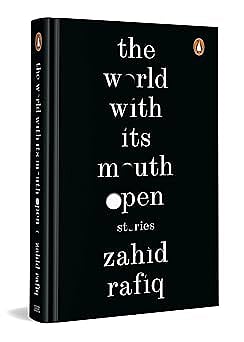Haunted Spectres

Set in Kashmir, former journalist Zahid Rafiq’s debut collection of short stories explores the responses of a traumatised population to the mundane demands and temptations of life. The shops, streets, and gardens of the state show people struggling to find steady employment and respite from society’s binds, men hardened into silence in the face of loss, and youth seeking temporary adventure or resigned to an unforgiving fate. Not every story alludes to the military’s presence, but Rafiq’s quiet, unnerving stories make it clear that the populace is haunted, that life’s difficulties are exacerbated, not eclipsed, by state violence.
“Is [Kashmir] a place for jokes?” asks the anguished victim of a prank. An anonymously submitted obituary has pronounced him dead in the day’s paper. This lie sets in motion his descent into paranoia and madness. If the newspaper lies, the man fears that no source of truth remains in this censored place. Though some version of what civilians endure is preserved through the local news, it is obvious that the beatings and humiliations the young men suffer are too routine to be shared except anecdotally.
Many characters teeter on the edge of reason. They follow spectres through the lanes of their city, parting crowds and neglecting errands to pursue what they know to be fleeting. Some dream of houses they must locate and spend afternoons searching for a wall seen once in a dream. Others seek refuge in silence, untethering themselves from the obligation to be present in the world and staring into the distance.
Imran Khan: Pakistan’s Prisoner
27 Feb 2026 - Vol 04 | Issue 60
The descent and despair of Imran Khan
Amid this unspooling despair is the predictable cruelty of shopkeepers turning away job applicants and husbands silencing the concerns of their wives. The resonance of Rafiq’s fiction extends far beyond the location, showing us an instantly recognisable India: hierarchical, prideful, and at times hateful towards minorities and women. In the titular story, a tutor beats a boy for not adequately preparing for a test. After savaging the child with blows from stinging nettle, he tells the boy that what awaits him outside is, “The world with its mouth open.” The lines call forth an image of a whale’s widening mouth, ready to consume and obliterate.
A shopkeeper hoping to modernise his operation receives a mannequin that, by some quirk of manufacturing, sports an expression of unspeakable sadness. Unsettled, he sets out to return it, traversing the city in a journey reminiscent of those taken by the characters chasing ghosts and figments. Arriving as omens and intuition, the unexplainable is both magnetic and suffocating. As they venture into neighbourhoods they’ve never been to before, their otherness and the futility of their mission are recognised and reinforced with every stare. A sense of being surveilled and of impending hostility plagues the protagonists—each afraid of the future in their own way.
Rafiq allows us to reflect on women’s bodies, real or mannequin, and the place they occupy in the mind of teenage boys. Instead of lecherous evil, he reveals a macabre, almost clinical curiosity at the heart of early desire. The stories have little interest in clarity or consolation. They seem to revel in their temporality, the deceptive glimpses of life they offer. A remarkable aspect of these stories is their focus on days and incidents with no obvious consequence. It is apparent to the reader that these days will be folded into the rhythm of life, that the characters themselves may only think of them occasionally. Rafiq is careful to demonstrate that the events do not represent their lives. As a reader, it’s refreshing to be engaged in a way that highlights how little we understand what we are witnessing.
Effective in their fluid simplicity, these stories are stripped of judgment and lament—though not consequence. The World with Its Mouth Open heralds the arrival of an assured and disquieting voice in fiction.

